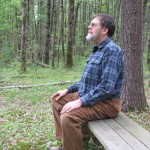Since March 26, our family has generated another 14 oz. of plastic waste (as always, including the recyclables, given the limitations of that process with plastic).
Two nights ago, I reached a sad landmark: the last of our edible carrots have been used.
Over the winter, the winter keeping systems we fashioned worked very well. Of the thirty pounds of carrots we laid down in sawdust, we might have lost five in recent weeks to rot–all the rest held up nicely, despite the surface discoloration they had almost from the first. They remained as crisp and fresh as the day we brought them home up until the last week, when the temperatures took a turn for warm weather at last.
I suspect that, in another, shorter winter, we’d have lost more of them sooner. But, still, I was impressed by how close to our actual need for carrots thirty pounds turned out to be, and how effective it was to store them in sawdust in the unheated garage.
I was disappointed in the CSA’s potatoes–they were very small and dirty, and I found myself reaching for the conventionally-grown local potatoes instead much of the time. I didn’t use them all up, and I think that, instead of stocking up on those, I’ll just get more of the local, conventional potatoes next year in their stead. So instead of thirty pounds of each, I’ll probably go for thirty pounds of conventional potatoes… and store more of some of the veggies we couldn’t get enough of, like the beets.
(Who knew how amazing beets were going to taste? These have become my favorite winter vegetable.)
In any case, the potatoes have all begun to sprout now, and there are few, if any that are still usable. (If I’d already begun gardening, I might have a use for them in the ground… but since I’ve never grown potatoes, and I have a pretty big learning curve ahead of me as a gardener already this year, I’m going to let that opportunity slip past me this year.)
The local onions also held up well–I’ve got the last of those in the fridge now, so they won’t sprout any more than they already have. Again, thirty pounds of onions was just about the right amount, and the place we found to hang them seemed to do the trick.
Other things I’ve learned, about storing vegetables over the winter:
- Frozen zucchini rocks. I’d thrown some into the freezer last summer just as an experiment, not thinking I’d enjoy it very much when winter came around. But I learned that just a handful of chopped, thawed, zucchini, thrown into a spaghetti sauce before serving, brings the taste of summer to a plate of pasta. I probably froze only two or three pounds of zucchini last summer–I will probably triple that this year.
- Dilly beans are awesome. Again, I made this just to see how it would taste. We found ourselves chopping up the beans and adding them to our lunches–rice and beans–every day until they ran out. Dilly beans have a lot of flavor, a lot of crispness, and they really made those lunches delicious. I put up about two pounds of beans last year, but this summer, I hope, again, to double or triple that amount.
- Zucchini pickles were not worth the trouble. Despite my childhood memories of how good my mom’s were, I won’t bother with these again.
- Pickled cabbage is fantastic! I told myself that this was a waste of time. After all, local cabbage is not hard to obtain for most of the winter, so making dishes like braised cabbage is easy enough all winter long, right? Wrong. I’d reckoned without the exhaustion of a heavy winter teaching load. While they lasted, the quart jars of pickled cabbage (I used basically a sweet pickle recipe) were among my favorite convenience foods. All I had to do was open a jar, take out some cabbage with tongs, and put it on a plate. Voila! Instant vegetable. (Fresh cabbage I saved to go into salads, together with sprouts from the windowsill and, once they were available at the winter farmer’s market, fresh spinach.)
- Home-made sauerkraut? This was a “funny once.” I’ve done it. It’s amusing to see how it works. But the end result is not tasty enough to be worth the effort.
- Kale kills. Well, not normal people, of course. And I love it. For that matter, so does my husband… but it interferes with his blood thinner, so there will be no more kale at our house.
- Chard is boring. At least frozen chard. Which is too bad, because kale, which isn’t so boring, isn’t a possibility. Ah, well.
- A girl can’t have enough frozen blueberries. Though frozen raspberries are a second best. Canned berries, however, are a waste of effort and shelf-space. (This is not to be confused with the jams and jellies I put up last summer, which were popular with us and made nifty presents, too.) But those blueberry pancakes and pies were… amazing.
Perhaps the most important discovery, though, was how very possible it is to be a winter locavore, with a little advance preparation, access to the co-op and to the winter farmer’s market. And it didn’t feel like deprivation… rather, it helped me to discover a whole seasonal palette of foods I would not have ever noticed, back in the days of year-round grocery-store lettuce salads, frozen peas, and frozen spinach.
And I bet those first real fresh tomatoes are going to taste astonishing, come July.
Peter and I have joined the CSA for this summer, so we’ll get to enjoy local eating at its best, having made it through most of the winter on local and seasonal produce. I think it’s going to be a blast.
var fctb_tool=null; function FCTB_Init_488e96cc02810e498e453db7fdaf54e6(t) { fctb_tool=t; start(fctb_tool); } FCTB_Init_488e96cc02810e498e453db7fdaf54e6(document[‘FCTB_Init_cd28699e749941469bc411bfd0ada3cd’]); delete document[‘FCTB_Init_cd28699e749941469bc411bfd0ada3cd’] var fctb_tool=null; function FCTB_Init_12f3672632dca146b882593acd2a41b7(t) { fctb_tool=t; start(fctb_tool); } FCTB_Init_12f3672632dca146b882593acd2a41b7(document[‘FCTB_Init_bcf168a49e8f2d48a0b3afbbe1c6093f’]); delete document[‘FCTB_Init_bcf168a49e8f2d48a0b3afbbe1c6093f’]
var fctb_tool=null; function FCTB_Init_15593a42d6bb9d489fee59d589d921d3(t) { fctb_tool=t; start(fctb_tool); } FCTB_Init_15593a42d6bb9d489fee59d589d921d3(document[‘FCTB_Init_dad8eecd961f8e49bd6878cea3db2764’]); delete document[‘FCTB_Init_dad8eecd961f8e49bd6878cea3db2764’] var fctb_tool=null; function FCTB_Init_19aae9b2b33c024793a71e3672889716(t) { fctb_tool=t; start(fctb_tool); } FCTB_Init_19aae9b2b33c024793a71e3672889716(document[‘FCTB_Init_135bdf891a10364c8553a6f3e8ba2949’]); delete document[‘FCTB_Init_135bdf891a10364c8553a6f3e8ba2949’]
var fctb_tool=null; function FCTB_Init_ddd4241d7df4664fb804f43ae8d535e2(t) { fctb_tool=t; start(fctb_tool); } FCTB_Init_ddd4241d7df4664fb804f43ae8d535e2(document[‘FCTB_Init_e455b18b5a8d36419b35b49c88b9fd38’]); delete document[‘FCTB_Init_e455b18b5a8d36419b35b49c88b9fd38’] var fctb_tool=null; function FCTB_Init_df550d3f66283b4f83bb0bd336763e3b(t) { fctb_tool=t; start(fctb_tool); } FCTB_Init_df550d3f66283b4f83bb0bd336763e3b(document[‘FCTB_Init_3bc1f190f01bfc4db9fe7a28e0f8434c’]); delete document[‘FCTB_Init_3bc1f190f01bfc4db9fe7a28e0f8434c’]
var fctb_tool=null; function FCTB_Init_acd7d07d8294e44496ded66f3bc74cf1(t) { fctb_tool=t; start(fctb_tool); } FCTB_Init_acd7d07d8294e44496ded66f3bc74cf1(document[‘FCTB_Init_897d78a0979fec40b389cd29361838de’]); delete document[‘FCTB_Init_897d78a0979fec40b389cd29361838de’] var fctb_tool=null; function FCTB_Init_0d247b1689c390499dd67891735305ae(t) { fctb_tool=t; start(fctb_tool); } FCTB_Init_0d247b1689c390499dd67891735305ae(document[‘FCTB_Init_db4508fe7dd3aa4d93f6d34d7bbd6e55’]); delete document[‘FCTB_Init_db4508fe7dd3aa4d93f6d34d7bbd6e55’]
var fctb_tool=null; function FCTB_Init_3a6e3f85347df24599d61c5dcdc2a0bc(t) { fctb_tool=t; start(fctb_tool); } FCTB_Init_3a6e3f85347df24599d61c5dcdc2a0bc(document[‘FCTB_Init_5b29023e8f64b940b0e580551223217c’]); delete document[‘FCTB_Init_5b29023e8f64b940b0e580551223217c’] var fctb_tool=null; function FCTB_Init_4ba4181f05712642b59e36ee14699f96(t) { fctb_tool=t; start(fctb_tool); } FCTB_Init_4ba4181f05712642b59e36ee14699f96(document[‘FCTB_Init_b40ec70a365d864f8b5be36cff924a9a’]); delete document[‘FCTB_Init_b40ec70a365d864f8b5be36cff924a9a’]
var fctb_tool=null; function FCTB_Init_ea31adbdd0025f49bc9cfe41f2dd841a(t) { fctb_tool=t; start(fctb_tool); } FCTB_Init_ea31adbdd0025f49bc9cfe41f2dd841a(document[‘FCTB_Init_7a625e2825631f439ac4ceb4654dfadf’]); delete document[‘FCTB_Init_7a625e2825631f439ac4ceb4654dfadf’] var fctb_tool=null; function FCTB_Init_148590e9247aa34a8861fcaa55073c9f(t) { fctb_tool=t; start(fctb_tool); } FCTB_Init_148590e9247aa34a8861fcaa55073c9f(document[‘FCTB_Init_5e8244dd7e1c7e4d9d15b5f16537782b’]); delete document[‘FCTB_Init_5e8244dd7e1c7e4d9d15b5f16537782b’]















